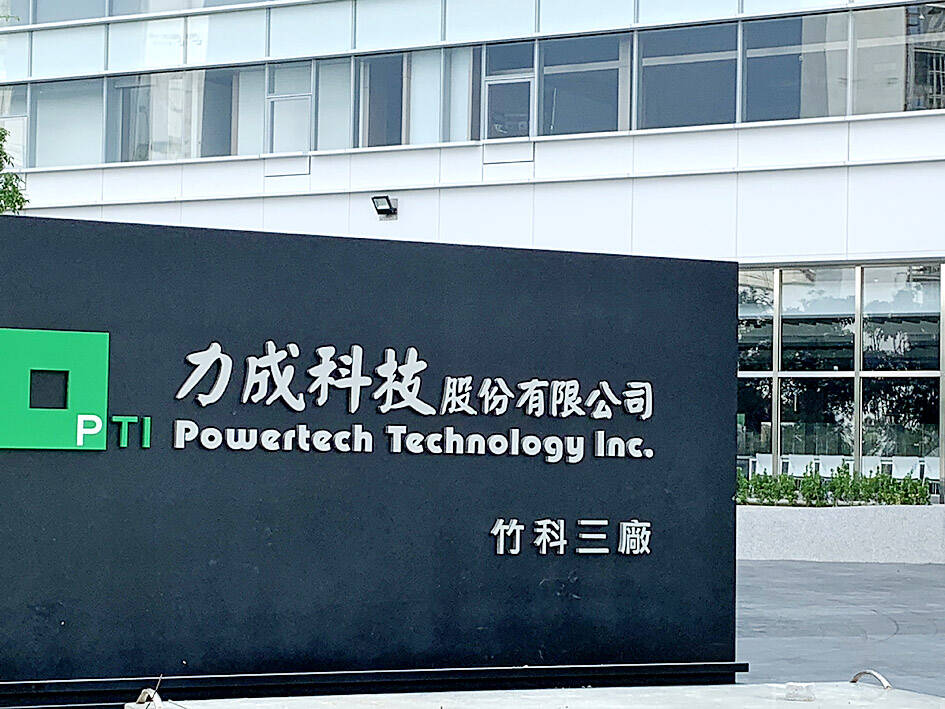Chip testing and packaging service provider Powertech Technology Inc (PTI, 力成科技) plans to increase this year’s capital expenditure by 50 percent to expand capacity to meet growing demand for advanced memorychips used in artificial intelligence (AI) products.
The company proposed to spend NT$15 billion (US$460.94 million) to expand advanced capacity and equipment, compared with a budget of NT$10 billion it planned three months ago.
“We are seeing a recovery in market demand as well as new business opportunities. We will spend heavily on advanced packaging” equipment, Powertech chief executive officer Boris Hsieh (謝永達) told investors on Tuesday. “We will focus on ramping up advanced technologies we have developed in the past few years. We believe PTI will begin to harvest its investments in advanced technologies this year.”

Photo: Grace Hung, Taipei Times
A major portion of the capital budget would be spent on advanced, or 2.5D, packaging technologies used in AI and high-performance computing (HPC) chips, including through-silicon vias technology for high-bandwidth memorychips and advanced testing technology, the company said.
The investment would also be used to boost advanced flip chip ball grid array technology packaging capacity for higher-density and faster advanced DRAM DDR5 chips, which are used in edge AI devices such as smartphones and computers with AI capabilities, it said.
The Hsinchu-based memorychip packager expects a gradual increase in revenue contribution from advanced packaging and testing technologies for high-bandwidth memorychips from the final quarter of this year, given equipment supply constraints.
In the near term, PTI expects revenue this quarter to grow a mid-to-high single-digit percentage this quarter from NT$18.33 billion last quarter, thanks to a pickup in chips used in consumer application chips from the current quarter, Hsieh said.
“As demand for PCs, smartphones and consumer products gradually increases in the second quarter, revenue will grow compared with the first quarter,” Hsieh said. “Besides, data center and HPC application demand is driving an increase in DDR5 DRAM.”
NAND flash memorychip packaging and testing revenue is expected to grow by a double-digit percentage sequentially this quarter due to rising demand for solid-state drive storage for data centers, he said.
“We are optimistic that AI-related applications will gradually emerge in the second half,” he said.
The company expects chip packaging equipment utilization to rise to about 75 percent this quarter from 70 percent, while testing equipment use is to increase to 55 percent from 50 percent.
DRAM packaging and testing services accounted for 24 percent of the company’s total revenue last quarter, while NAND flash memorychips made up 28 percent. Logic packaging and testing services accounted for 37 percent.
PTI on Tuesday reported annual growth of 54 percent in net profit for last quarter, totaling NT$1.74 billion, compared with NT$1.13 billion in the first quarter of last year.
On a quarterly basis, it declined 56 percent from NT$3.97 billion, including an asset disposal gain of NT$2.6 billion.
Earnings per share rose to NT$2.32 last quarter from NT$1.51 in the same period last year, but plummeted NT$5.31 in the previous quarter.

KEEPING UP: The acquisition of a cleanroom in Taiwan would enable Micron to increase production in a market where demand continues to outpace supply, a Micron official said Micron Technology Inc has signed a letter of intent to buy a fabrication site in Taiwan from Powerchip Semiconductor Manufacturing Corp (力積電) for US$1.8 billion to expand its production of memory chips. Micron would take control of the P5 site in Miaoli County’s Tongluo Township (銅鑼) and plans to ramp up DRAM production in phases after the transaction closes in the second quarter, the company said in a statement on Saturday. The acquisition includes an existing 12 inch fab cleanroom of 27,871m2 and would further position Micron to address growing global demand for memory solutions, the company said. Micron expects the transaction to

Vincent Wei led fellow Singaporean farmers around an empty Malaysian plot, laying out plans for a greenhouse and rows of leafy vegetables. What he pitched was not just space for crops, but a lifeline for growers struggling to make ends meet in a city-state with high prices and little vacant land. The future agriculture hub is part of a joint special economic zone launched last year by the two neighbors, expected to cost US$123 million and produce 10,000 tonnes of fresh produce annually. It is attracting Singaporean farmers with promises of cheaper land, labor and energy just over the border.

US actor Matthew McConaughey has filed recordings of his image and voice with US patent authorities to protect them from unauthorized usage by artificial intelligence (AI) platforms, a representative said earlier this week. Several video clips and audio recordings were registered by the commercial arm of the Just Keep Livin’ Foundation, a non-profit created by the Oscar-winning actor and his wife, Camila, according to the US Patent and Trademark Office database. Many artists are increasingly concerned about the uncontrolled use of their image via generative AI since the rollout of ChatGPT and other AI-powered tools. Several US states have adopted

A proposed billionaires’ tax in California has ignited a political uproar in Silicon Valley, with tech titans threatening to leave the state while California Governor Gavin Newsom of the Democratic Party maneuvers to defeat a levy that he fears would lead to an exodus of wealth. A technology mecca, California has more billionaires than any other US state — a few hundred, by some estimates. About half its personal income tax revenue, a financial backbone in the nearly US$350 billion budget, comes from the top 1 percent of earners. A large healthcare union is attempting to place a proposal before